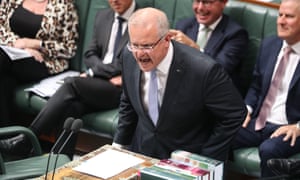PM says government is ‘not currently’ considering taxpayer indemnity from carbon risk, estimated at $17.5bn
Scott Morrison has left open the option of his government
indemnifying a new coal plant in Collinsville from future carbon risk,
despite moderate Liberals declaring there should be zero taxpayer
support for the project.
With Nationals and Liberals publicly at odds over new coal investments, and whether the government’s current climate change policies need a reboot, Labor asked the prime minister in question time whether the government was prepared to give the Collinsville project a taxpayer indemnity from carbon risk.
Morrison stepped around the question from the shadow climate change minister, Mark Butler, saying that matter was “not currently before the government”.
He said the government was examining options like the Collinsville project because it wanted to deliver jobs in north Queensland,
and manufacturing industries needed access “to the reliable power it
needs to ensure that they can support jobs and livelihoods into the
future”.With Nationals and Liberals publicly at odds over new coal investments, and whether the government’s current climate change policies need a reboot, Labor asked the prime minister in question time whether the government was prepared to give the Collinsville project a taxpayer indemnity from carbon risk.
Morrison stepped around the question from the shadow climate change minister, Mark Butler, saying that matter was “not currently before the government”.
One of many obstacles preventing private investment in new coal-fired power generation is that proponents have struggled to get finance because they are unable to predict future carbon risk, particularly given Australia’s decade-long parliamentary standoff over emissions reduction policies.
In 2018, the energy minister, Angus Taylor, held open the option of providing indemnities, telling Guardian Australia the government would look to remove the risks stopping investment in new power generation.
“I’m saying we will look at whatever risks that can’t be managed by the companies that need to be managed to get investment,” he said.
“What we are saying is the risks that government needs to absorb to get investment in reliable generation, we will look at absorbing. We need the investment.”
But the case for Collinsville remains unclear. The Australian Energy Market Operator (Aemo) noted in 2018 there was currently an “energy surplus” in north Queensland, and “further large-scale generator connections are unlikely to be efficient in north Queensland until existing thermal generation in central Queensland starts to retire” in the 2030s.
Late last year, Aemo said “due to the already low cost of renewables and their firming options, and their projected future reductions”, the lowest cost replacements for emissions-intensive generation would be a “portfolio” of renewable, storage, gas-powered generation, demand management and network resources. New coal was not on the radar.
In terms of indemnities, the Ai Group argued in 2018 that net present value of fully offsetting the lifetime emissions of a new 2GW “high-efficiency low-emissions” power plant could be $17.5bn, and more than $1.3bn annually by 2030, depending on what carbon policies were ultimately adopted.
Bob Katter, the member for Kennedy, declared on Tuesday the proposal currently on the table at Collinsville “doesn’t stack up financially” and called on Nationals “to stop using the north as a plaything for their own leadership battles”.
The government’s decision on Saturday to unveil the $4m feasibility study with Shine Energy into the Collinsville proposal has reopened the Coalition’s rolling internal debate over climate action, with Sydney Liberals Trent Zimmerman and Dave Sharma arguing on Monday the federal government should not back new coal plants.
The Nationals, embroiled in internal factional brawling between supporters of Michael McCormack and the former leader Barnaby Joyce, are squaring off against those Liberals in metropolitan seats.
The former resources minister Matt Canavan, who lost his cabinet post last week after lining up behind Joyce’s unsuccessful run at McCormack’s leadership, told Tuesday’s meeting of the Coalition partyroom that MPs, meaning metropolitan Liberals, should reserve judgment on the Collinsville proposal until the results of the feasibility study were known.
Canavan and his Queensland colleague George Christensen have been arguing the Coalition’s support for coal jobs was the reason Morrison prevailed in last year’s “miracle” election. Labor suffered a rout in regional Queensland.
Canavan also heckled his former cabinet colleague Simon Birmingham in Senate question time on Tuesday. Answering a question about the status of Collinsville, Birmingham, the trade minister, told the chamber “the government is not funding a new coal-fired power station” – but Canavan interjected: “Not yet”.
After days of disunity, Scott Morrison read the riot act. He warned his MPs on Tuesday to focus on the Australian people and move past the Coalition’s “difficult period” of recent months. He said there were only “two party rooms in this building” – that of the government and that of the opposition.
Morrison said the Australian people had endorsed MPs as a “government” and that no individual was above that.
The treasurer, Josh Fyrdenberg, told colleagues he was frustrated that the “historic” visit on Monday by the Indonesian president was overshadowed by the Nationals’ turmoil, and urged them to focus on the issues that mattered to voters, including economic management and lower household power prices.
“We must all focus on those achievements and our policies and plans going forward and put internal issues of recent days behind us,” he said.

No comments:
Post a Comment